- Home
- Parris Afton Bonds
Renegade Man Page 3
Renegade Man Read online
Page 3
She brushed away wisps of clipped hair from his drooping mustache. “Well, the empire ain’t what it used to be. I think Cattle Baron lost some of his drive after Chap left, but he’s still one of the richest men in this part of the state.
“There.” She smiled at him in the mirror. “You look like you’re almost civilized, Jonah. Make it into town often?”
“Only to do my laundry and grocery shopping.”
“The Border Cowboy Bar is still there.”
He glanced in the mirror at her hands as she unsnapped the plastic cape. No wedding ring. He had just assumed she was married.
She caught his eyes. “Divorced. Five years last February. Stan Acton.”
Of course. The high school jock and class president.
“Stan got itchy feet. Got tired of being tied down, tired of small town life.” She tried to smile brightly. “You know how it is when you get married just out of high school.” She flushed. “Well, I don’t guess you would.”
He smiled. “I might head into town one evening when I get tired of listening to the coyotes baying at the moon. The Border Cowboy still got two dance floors?”
He and Nelda chatted a while longer, and by the time he got back to the laundromat, it was after five and the attendant had left. Only one other person was there, folding clothes as she removed them from the dryer. He should have known he’d run into Rita-lou Randall. The woman just might be standing in the way of him achieving his lifelong dream, and now he had to be polite to her.
He nodded curtly to her and strode on down the aisle to hunt for the dryer in which the attendant had left his clothes. In uneasy silence, the two of them folded their clothing.
He flicked her a sideways glance. Her chin, as square as her grandfather’s, was tilted haughtily. She looked almost as if she were in high school again, with her hair caught back in a ponytail that way. Her jean- clad figure was better than any teenager’s. Full- bodied. Had she gone ahead and had Chap’s child?
“You’re folding your shirt wrong,” she snapped without even looking at him.
“Well, Ms. Randall, I wasn’t planning on wearing it to a military ball.” He tossed the flannel shirt on top of a pile of white sweat socks.
She ignored his emphasis on “Ms.” and asked, “Didn’t your wife ever make you help out at home?” She still wasn’t looking at him as her hands rapidly matched up socks and stuffed them together some way or another.
“No wife. The ship’s laundry did my clothes.”
“You’re supposed to fold your towels in triplicate. Why not?”
He tossed the doubled towel on top of his shirt. “Why not what?”
“Why no wife?”
“I was in too many ports to ever settle down.”
The silence grew oppressive.
“You have a husband?”
“He’s dead.”
Dead silence followed.
After a moment he grunted and said, “Look, let’s call a truce until the BLM comes to some kind of a decision, okay?”
She looked at him askance. “A truce. Not a surrender. That’s my land out there for the summer.”
“For the moment.”
She narrowed her eyes at him. They were heavily lashed, making it difficult for him to read them easily. Then she sighed and said, “All right, a truce—for the moment. What were you doing in all those ports?”
“Oh, salvaging ships, underwater welding, things like that.” That didn’t even begin to cover it, he thought. Just the training had been so grueling that more than half the SEAL candidates had dropped out.
She smiled, and despite the brittle look in her eyes, it was an astonishingly lovely smile. He had forgotten its charm. She hadn’t smiled that often, but when she had... “I imagine there was much more to your job as a SEAL than ‘things like that.’ ”
“How’d you know I was a member of the SEAL team?”
“After you filed at the courthouse today, I came in about fifteen minutes behind you. It was easy enough to read your previous occupation on the petition. SEALs? Sea-Air-Land team? The navy’s special- warfare divers, isn’t it?”
“Yeah.” He caught a glimpse of a pair of lacy panties as she quickly and neatly folded them. “We do demolitions,” he said, his mind on the provocative picture that had suddenly filled his mind. “Hydro graphic reconnaissance, disarming explosives, submarine rescues—jobs along that line.”
“Sounds top secret.”
“A lot of it was.”
“Espionage?”
She was well-informed, he realized. His job, toward the last, had taken him all over the globe and involved him in the internal affairs of several shaky governments. His life had often depended on his being closemouthed. It was something he seemed incapable of being at the moment. He hedged. “If that means listening to the gossip you hear around foreign ports, I suppose you could classify some of my work as espionage.”
“Then you must know some foreign languages.”
“The SEALs send you to school for that.”
“Sort of like getting a G.E.D.? Well, which ones did you learn?”
“I’m fluent in Farsi and get by in Spanish. I never mastered German or French.”
“You’ve come a long way from the town ne’er-do- well, haven’t you?” There was no barb in her voice.
“Not really.” He cast her a hard look. “I quit the job you got me lumberjacking—to pursue a dream.”
A self-deprecating smile tugged at her lips. “I suppose I’m following my own dream.”
“And what dream is that?”
She shrugged her shoulders. “Finding evidence of a prehistoric man that predates the Folsom Man. To that end, I’ve been going to college on and off for the last fifteen years.”
After all these years, he was curious to know more about the girl who had been his first love. He supposed he should hate her. For a while he had spent his nights doing just that. “You get a degree in archaeology?”
“No, anthropology. At the University of Houston. I’m what’s called a paleoanthropologist—I study people who lived before recorded history.” Apparently she felt as if she had sounded a little pretentious, because she smiled apologetically and added, “I studied foreign languages, too. And I was also abysmal at French.” The way her lips curved brought back blurred memories, as did the lingering scent of some tantalizing perfume. “I did better at Hindi, though,” she went on. “On-site training. Ever heard of the Earthwatch organization?”
He shook his head. “Nope, don’t believe so.”
“It finances people who want to work on a particular research project, and in return they offer Earthwatch an opportunity to send someone to work in the field as a research assistant. One summer I helped an anthropologist excavate a site in India. That’s when I realized I wanted to get a degree in anthropology.”
“You must have done pretty well for yourself to be working on a project of your own now.”
Her face became expressionless, and she began shoving her folded clothing into a plastic laundry basket. “You might say I survived.”
So it was true, then. She had taken the money old man Kingsley bought her off with. Still, he had to give her credit. She had spunk. She always had. She had ignored public opinion and gone her own way in Silver City.
Without even looking at him again, she picked up the basket, turned and called back over her shoulder, “See you around. Maybe.”
“Ritz.”
She stopped and looked back at him. A wariness crept into her eyes. “Yes?”
“Have you asked about Chap since you’ve been back?”
He watched her jaws tighten. She shook her head, and her ponytail, glowing like gold, swished against her neck.
“He left the week after you did, and no one knows where he went. He’s never come back.”
Something ominous darkened her eyes, or maybe, he thought, it was as if a light went out in them temporarily. At that moment, he regretted telling her. What was he trying to d
o? Even old scores? He had gotten over her. He might not have settled down, but it wasn’t because he’d been saving himself for his first love. Nevertheless, at that moment he felt like the biggest rat in the world.
She turned and walked out the door, and all he could think of was that old Roy Orbison tune, “Crying.” He told himself that was ridiculous, but it didn’t stop the thoughts that were running through his mind.
Chapter 3
On her first dig, in Guatemala, all the undergraduates had been enthusiastic for the first few weeks, but the artifacts had been few, the weather hot and the conditions filthy. Soon the fever had begun to cool until, by the end of the third month, only the most determined had still been at it. Rita-lou had been one of those die-hards.
She had despised being dirty, had despised going days without a decent bath. It had been too close to the conditions she had grown up with. Still, something inside her had thrilled at going back in time, at tracing the footprints of her cultural heritage, at having a front row seat in their discovey. Maybe, she thought, anthropology was an escape for people like herself. She had certainly enjoyed finding the remains of men who had once walked the earth. When you ate and slept and worked together, sweating under the torrid sun, a camaraderie developed between you. She had learned to appreciate people she would never have thought of associating with prior to that first dig.
Camaraderie was certainly something she wouldn’t find on this dig. The nearest human being was a quarter of a mile away, and that was too close. If Jonah Jones thought he could thwart her, he didn’t know her very well. Robert had always said she had the tenacity of a bulldog.
Her husband had been both her friend and her lover, and he hadn’t been the least bit bothered that she wanted to keep her maiden name after their marriage. She didn’t retain her maiden name so much as a matter of feminine rights as from a desire for Silver City to remember her well when she achieved the success she sought.
Robert had been proud of her. He had never known her as “that wild Randall girl” and couldn’t have cared less about her past. She had missed him terribly in the three years since his death, but not enough ever to marry again. She was content with her life as it was. She had Magnum, and she had Trace. And she had her excavation. That was enough.
No, not quite. She had something to prove to the good people of Silver City.
She scratched Magnum behind the ears, and the dog’s intelligent, shiny black eyes glanced up at her quizzically. “Just letting you know I care, fella.”
In response, the Lab’s tail beat against the nearest balk, the long wall of earth between two excavated five-foot squares.
Armed with mosquito repellent and suntan lotion, she strolled over to the far side of the excavation, where she had started work on another square. Back to work. By autumn she hoped to have stripped down the site layer by layer. On the map she had laid out, she had imagined mastodons, saber-toothed tigers and long-horned bison roaming the site. She had until fall to establish that Renegade Man had also roamed there.
Delicately handling her trowel, she began scraping the dirt into a plastic scoop that had once been a gallon laundry-detergent bottle. No double-scraping for her. A single stroke brought the dirt off the surface cleanly. Her professor had once told her that the mark of a professional was the ability to dig a perfectly square hole without ever stopping to smooth the sides.
She was keeping her eyes open for the glitter of chopped flint, quartz or chalcedony, but what she was really looking for were those telltale pebbles that were out of place geologically, water-rolled stones in a field without stones. More often than not she found old rabbit droppings, and once she even unearthed a scorpion that flagged its tail warningly.
At one point she came across a thorn fish hook, but a close look through her jeweler’s glass proved it to be relatively recent Amerind. Probably a precursor of the Mimbres or Warm Spring Apaches. The tribe’s warrior-chieftain had been Mangas Coloradas, who, after surrendering, had been treacherously killed at nearby Fort McLane.
The Silver City area was filled with treachery, she thought. Then she grimaced at her childishness and filed the fish hook away in one of the lunch sacks marked with a coded acquisition number: grid 3 south, 4 east. Later, when it was too dark to dig, she would number and enter her finds in a register.
Something about the isolation of her site, especially when contrasted with her memories of the close- knit conditions she had worked in before, put her in a pensive, soul-searching mood. The plaintive call of a mourning dove in a ponderosa pine close to the creek rendered her mood even more morose. Ever since her last trip into town two days before, when Jonah had bluntly told her that Chap had left Silver City a week after she had, never to return, she had felt a despondency that had been hard to shake.
She wasn’t quite certain what she had expected from a confrontation with Chap. Maybe she had just wanted to see his expression when they came face-to- face. Remorse? Shame? Indifference? Or still love, after all these years? But she had certainly expected to see him again.
Chap! Chap, love of my youth! Why didn’t you have the courage to stand up to your father? Why, if you were going to leave, didn’t you leave with me?
She could only guess at the answer to the last question. He had been running, running away from himself.
She could almost hate Jonah Jones for telling her about Chap. And then there was his refusal to recognize her right to explore the land despite his mining claim. Really, the man was exasperating. And overbearing. She didn’t remember him being that way, but then, she didn’t remember that much about him— hadn’t even thought about him in a long time.
After Chap first kissed her in the Kingsley conservatory that fateful summer, she had known that there could be no one else in her life.
She hadn’t wanted to hurt Jonah, a skinny, gangling kid with a slightly crooked front tooth and rough, heavy, straw-colored hair that would never lie down. And those restless green eyes.
Like her, he had been from the wrong side of the tracks, and he’d been almost as poor as she was. They had just sort of drifted together, from grade school to junior high to high school. He had always been a dreamer. She could remember him telling her that when he was riding fence once in a sandstorm, he imagined it was the continual shower of saltwater spray that caked his face. And another time, when he scaled trees as a lumberjack, he told her how he often imagined they were masts of ships. Even then he’d had a yearning for the sea.
Jonah Jones certainly couldn’t be called scrawny anymore. Sinewy would be a better description. His straight and heavy hair—and his positively barbaric mustache—were the dark yellow-brown shade of split pine that had been left to season in the weather. He had shot up at least half a foot, and his shoulders didn’t seem to have an end. Swimmer’s shoulders, with a swimmer’s powerful legs to match. The wet suit he had been wearing had left nothing to her imagination. Neither had his hands. From the way they had moved over her in the river, she could very well guess how they would roam over a woman in bed.
The distant hum of a dredge engine, almost too low to hear, informed her that he was still at it, diving and suctioning the riverbed, looking for a streak of gold. If he succeeded, the area would be overrun by prospectors. She had to find Renegade Man first!
Another sound, a low rumble that began deep in Magnum’s throat, made Rita-lou sit back on her heels. Her gaze swept the scrubby bank. The fur on Mag¬um’s neck bristled, and he came to his feet. A moment later, a horse trotted out of the brush.
Instantly she recognized its rider. Buck Dillard— Meat Processor. This time his 30-30 was sheathed in its scabbard on the saddle, along with a lariat. Still sitting on her heels, she waited as Buck approached. Magnum bared his teeth, and she stroked his stiffened fur.
Buck reined in the pinto just short of the dig’s edge, puffing dirt over the side. He pushed his hat back on his head. His skin, from midforehead to thinning hairline, was white. “Morning, Rita-lou.”
“Morning. You wanted something?”
His lower lip was distended by a pinch of snuff. “Boss just sent me over to pay a neighborly visit, see how you was getting on.”
“You’ve paid it.”
He leaned forward in the saddle and spat into the excavation. “You could be a sight more civil, Rita- lou.” A leer played around his smug mouth. “After all, you and I went to school together.”
She knew exactly what he was thinking. That she would be an easy mark. Well, she had expected that kind of illiterate, rednecked mentality when she made up her mind to come back to Silver City. She was still being condemned for the mistake she had made. A mistake she would have made all over again, since it had meant having Trace in her life.
Magnum growled, a menacing sound that forecast trouble. She caught his collar. “Hush, Magnum. You’d better leave, Buck.”
He eyed the dog with contempt. “Magnum. A weird name. For that champagne stuff?”
“Not for the bottle.” Her smile, she thought, probably resembled the Lab’s bared canines. “For the Smith and Wesson.”
Her expression obviously annoyed him. “You oughta keep a leash on that dog. He might get mistaken for a coyote or a wolf.”
Magnum was straining at his collar, and she was relieved when Buck wheeled the pinto around and rode away. “It’s all right, fella,” she said soothingly.
After she put a pot of leftover stew on the burner, turned low, she went out to the work tent, where her lab equipment was set up: a washtub, a mesh screen, cleaning chemicals and brushes and cigar boxes for sorting. Quickly she culled the potsherds and lance heads she had found that morning, separating any that might suffer damage. She wanted to finish her morning’s sorting and washing before she broke for lunch, and she hurriedly cleaned a brass button with an eyedropperful of sodium bicarbonate solution, humming as she worked.

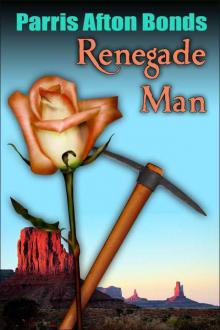 Renegade Man
Renegade Man Sweet Enchantress
Sweet Enchantress Savage Enchantment
Savage Enchantment Mood Indigo
Mood Indigo Indian Affairs (historical romance)
Indian Affairs (historical romance)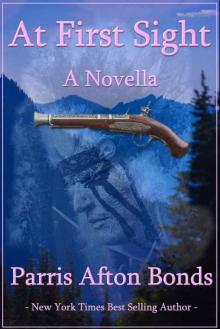 AT FIRST SIGHT: A Novella
AT FIRST SIGHT: A Novella The Maidenhead
The Maidenhead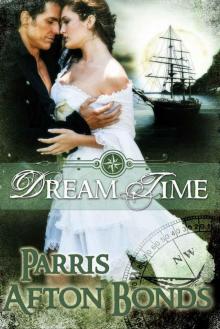 Dream Time (historical): Book I
Dream Time (historical): Book I Made For Each Other
Made For Each Other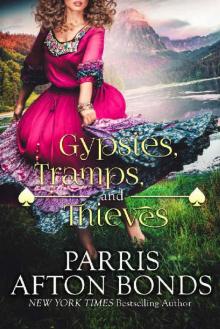 GYPSIES, TRAMPS, AND THIEVES
GYPSIES, TRAMPS, AND THIEVES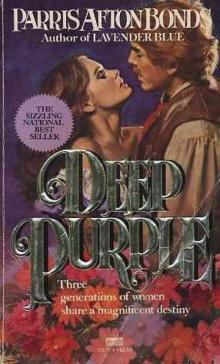 Deep Purple
Deep Purple Tame the Wildest Heart
Tame the Wildest Heart LAVENDER BLUE (historical romance)
LAVENDER BLUE (historical romance)